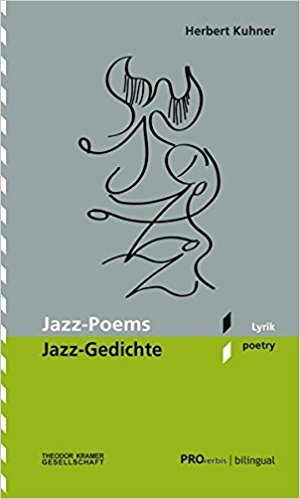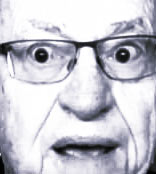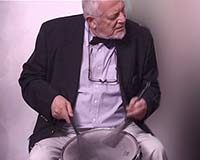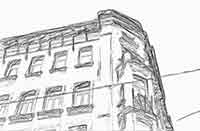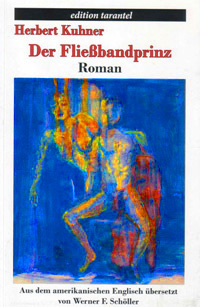Austrian Socialist Party Paragons

Rudolf Gelbard
Rudolf Gelbard is a walking encyclopedia of recent Austrian political history. He did not have a chance to study in his youth, due to internment in Theresienstadt Concentration Camp. In spite of his lack of “formal ” academic education, Gelbard is a scholar who has gathered valuable political information on fascism and anti-Semitism.. That is why my wife Irmgard and I recommended him for the honorary title of Professor. Numerous prizes followed.
Indeed Gelbard is consulted on historical matters, but so far Gelbard he has not been designated as official salaried historical consultant.
Gelbard’s apartment is a treasure trove of books, journals and papers on the subject, which are not archived or ordered. The true description of the premises, which I have not personally viewed, is helter-skelter.
Peter Lhotzky
For years Peter Lhotzky has been writing short biographies of men and women of integrity of the Twenties, Thirties and Forties of the last century, who were Socialists. Lhotzky has diligently published this material in internet and distributed it to his f riends
These admirable man and women of were mostly just plain folks who fought against National Socialism and helped those who needed help.
And guess who is NOT publishing these biographies? That’s right, the Austrian Socialist Party.
Isn’t publication finally due? They set an example and their lives should be made available to all interested readers.
I have done a piece on Peter, and I attach it here in English and German.
Peter Can’t Let Things Be
A moving evaluation of Peter Lhotzky’s notable efforts, at last!
– Susanne Bock, author
The present is a key to understanding the past, as well as vice versa.
– H. K.
Thought I’d write a piece on Peter Lhotzky, who is a kindred spirit. Peter can’t let things be. He has to say and write what he thinks, come what may. That’s a very bad trait, career-wise. But Peter hasn’t learned anything; he still goes on in that vein.
People like Peter cause some to feel ill at ease. There seems to be nothing more embarrassing as integrity and a genuine concern about one’s fellow man.
Peter did not rise in the ranks of the Social Democratic Party of Austria. He has a civil service job, or rather, had a one, since he’s going into retirement at this writing. But the pensioner Peter will continue to do what he’s been doing. Nothing can stop Peter, short of the Grim Reaper.
Peter is a passionate and eloquent speaker but not grandiloquent. He knows how to deliver his lectures and he is wont to raise and drop his voice in the right places. His words hit the mark because he doesn’t waste words.
Peter doesn’t have a large forum. He has the conference room of a local Party Headquarters at his disposal. Sometimes it is full and sometimes only a handful come to listen.
Such venues strike me as being ghettos where the idealists are stashed away. There, they can express themselves without doing any harm. The powers-that-be know that there is no place for these men and women in the nitty-gritty of daily politics. Using political position as a power lever and a springboard for personal gain just wouldn’t jell with them.
But back to our man Peter! The period he concentrates is on is the regnum of the Patriotic Front in Austria from 1934 to 1938. Not that he dwells on bygone times! He is aware that can’t look into the future without looking back at the past.
Peter writes and delivers brief pieces on personalities of the Twenties, Thirties and Forties. Some are about prominent politicians and engaged writers, but they majority of people Peter writes about were working-class men and women who were politically active and led exemplary lives. They, like Peter Lhotzky, were not interested in power and money or maintaining the status quo.
My God, I know this sounds corny, but I must say it! They went about trying to build a better world as Socialists. In other words, they did their utmost to cancel out poverty and bring social benefits to the common man.
Vienna is filled with living monuments to Austrian Socialism, the municipal housing developments that were built from the twenties to 1934, the year that Dollfuss took power. These developments are cities within themselves that bring a combination of privacy and communal contact. And even today they are utopian.
Chancellor Engelbert Dollfuss decreed the Socialist Party in Austria illegal and established a dictatorship, which was truncated in 1938 by a “peaceful” invasion led by Austria’s favorite son, Adolf Hitler, né Schickelgruber.
After 1934 the people Peter writes about continued their activities underground, and after 1938 they fought against National Socialism, which often meant imprisonment, deportation to a concentration camp, torture and execution.
Dollfuss was an adamant opponent of the National Socialists, as well as the Socialists. Hitler had him done in, so that Austria would be easy-pickings. Prior to that, he had SA-Chief Ernst Roehm polished off since Roehm was his rival for absolute power.
A Dollfuss cult was fostered by the Patriotic Front and the Catholic Church in Austria after his assassination, and at the present his portrait hangs to the right of the crucifix in the parliamentary headquarters of the Austrian Peoples Party, heir to the Christian Socials.
By canceling the Socialists out politically and by crushing them in the civil war of February 1934, Dollfuss paved the way for the Nazi takeover four years later.
Soon after the civil war, Dollfuss was brutally murdered and left to die in the Austrian chancellery by the Nazi putschists. He was a martyr indeed.
On the evening before his death, he had refused to grant clemency for Josef Gerl commenting. „Thank God that I can hang another Red.“[1] Nineteen-year old Gerl, a Revolutionary Socialist had set off had set off an explosive, damaging a railway installation. Thus the martyr Dollfuss made a martyr of Gerl.
And prior to that, after defeating the Socialists in the civil war, Dollfuss and his Minister of Justice Kurt Schuschnigg had sentenced nine Socialist Bund leaders to death. One of them Karl Münichreiter, was so badly wounded that he had to be propped up while the noose was adjusted. Thus, the martyr martyred nine men.
Here a quote by, Kurt Schuschnigg, the Minister of Justice, “We’re not Brown, but we’re definitely not Red.”[2]
In March of 1938, Schuschnigg declared in Parliament: “Red-white-red to the death!” just before caving in.
The Dollfuss Cult is enjoying a renaissance at the present time.
Opus Dei-founder and Nazi-sympathizer Javier Echevarría and Utascha-collaborator Alojzije Stepinac have both been canonized and Emperor Karl has been beautified. Thus, it might not be far-fetched to find Dollfuss on the canonical list.
Prior and after Pope John the 23rd, Vatican has had empathy those who may have erred while serving the cause. At the end of World War II, Pope Pius XII gave sanctuary to high-ranking Nazis, as well as Ustascha leaders like Ante Pavelic. The Ustascha engaged in such creative arts and crafts as making chains out of eyeballs. The Vatican “Rat Line” helped these “good Catholics” to escape to Spain and South America.
Bishop Alois Hudal, who was located at the Vatican, and Monsignor Otto Mauer in Vienna were Austrian operatives of the Rat Line.[3]
Here’s a quotation by Otto Mauer in 1948, three years after the Holocaust: “The Jews have immense influence on communism and capitalism. They pass themselves off as defenders of humanity…but they are nothing but a depraved people with a perverted spirit….They have been condemned to eternal damnation….They invariably choose the evil path.”[4]
And most recently in 1999, Pope John Paul II asked for clemency for Augusto Pinochet, mass-murderer but devout Catholic and Crusader against Bolshevism.
And most recently in 1999, Pope John Paul pleaded for the release of Augusto Pinochet when he was detained in Britain. The detainee was devout Catholic and Crusader against Bolshevism, albeit torture chamber and charnel house proprietor.
In 1945, when the Socialist Party was re-established, the “old time” Socialists favored inviting the exiles to return and paying compensation for lost lives, stolen goods and property. And they were opposed to integrating former National Socialists. Thus, there was no place for them in the front ranks of the Party for them and they were relegated to seats in the back rows.
If Peter hadn’t devoted himself writing and speaking about these men and women, many of them would surely be forgotten today.
I’ll end this by naming the names of the people Peter writes about. I’d like to do my part, as small as it may be, to register them in history.
Manfred Ackermann, Emma Adler, Helene Bauer, Hugo Breitner, Joseph Buttinger, Karl Czernetz Wilhelm Ellenbogen, Marie Emhart,Roman Felleis, Leopoldine Glöckel, Otto Glöckel, August Forstner, Emmy Freundlich, Muriel Gardiner, Rudolf Häuser, Karl Hand s Heinz, Marie Jahoda, Rosa Jochmann, Franz Jurica, Henriette Kotlan, Stella Klein-Löw. Käthe Leichter, Rudolfine Muhr Karl Münichreiter, Frida Nödl, Elisabeth Petznek, Ernest Pollak, Isabella Pollak, Adelheid Popp, Helene Potetz, Bruno Rother, Karl Schneller, Franz Schuhmeier, Amalie Seidel, Heinrich Steinitz, Herbert Tieber, Josef Wacke, Karl Oskar Helmer, Karl Waldbrunner, Koloman Wallisch, Paula Wallisch, Ernst Winkler and Max Winter.
Peter kann’s nicht lassen
Eine berührende Anerkennung Peter Lhotzkys nachhaltigen Bemühungen, endlich!
– Susanne Bock, Autorin
Die Gegenwart ist ein Schlüssel zur Vergangenheit, und auch umgekehrt.
– H. K.
Es kam mir in den Sinn, etwas über Peter Lhotzky, einen Gleichgesinnten, zu schreiben. Peter kann’s nicht lassen. Es drängt ihn, zu sagen und zu schreiben was er denkt, komme was da wolle. Das ist eine sehr schlechte Eigenschaft, wenn man weiter kommen will, aber Peter hat nichts dazugelernt; er geht nach wie vor denselben Weg.
Menschen wie Peter bewirken, daß sich mancher unbehaglich fühlt. Es scheint nichts zu geben, daß andere mehr in Verlegenheit bringt als Integrität und echte Sorge um den Mitmenschen.
Peter hat keine besondere Karriere in der Sozialistischen Partei Österreichs gemacht. Er hat als Staatsangestellter gearbeitet und ist nunmehr in den Ruhestand getreten. Aber der Pensionist Peter fährt fort wie bisher. Nichts kann Peter aufhalten, es sei denn der grimme Sensenmann.
Peter ist ein leidenschaftlicher und gewandter, aber nicht überheblicher Redner. Er weiß, wie seine Vorträge zu halten sind, und er hebt und senkt seine Stimme an den richtigen Stellen. Damit trifft er den richtigen Ton, ohne Worte zu verschwenden.
Peter hat kein großes Forum. Meistens hält er seine Vorträge im Konferenzzimmer seiner lokalen Parteizentrale. Manchmal ist es voll und manchmal kommt nur eine Handvoll um ihm zuzuhören.
Solche Veranstaltungsorte scheinen mir Ghettos zu sein, wo Idealisten versteckt werden. Dort können sie ihren Ideen Ausdruck verleihen, ohne Schaden anzurichten. Die Einflußreichen wissen, daß es keinen Platz für diese Männer und Frauen im auf und ab der Tagespolitik gibt, und mitzusingen, um ein Sprungbrett für persönliche Vorteile zu gewinnen, das ist nicht ihre Sache.
Aber zurück unserem Mann Peter! Die Periode, auf die er sich konzentriert, ist die Regierungszeit der Vaterländischen Front in Österreich von 1934 bis 1938. Nicht daß er nur in der Vergangenheit weilt! Aber er weiß, man kann nicht in die Zukunft schauen, ohne in die Vergangenheit zurückzublicken.
Peter schreibt und liefert kurze Dokumente über Persönlichkeiten der zwanziger, dreißiger und vierziger Jahre. Manche über bedeutende Politiker und engagierte Schriftsteller, aber die meisten, über die er schreibt, waren Männer und Frauen der Arbeiterklasse, die politisch aktiv waren und ein vorbildliches Leben führten. Sie, wie Peter Lhotzky selbst, waren weder an Macht und Geld noch and der Aufrechterhaltung der bestehenden Zustände interessiert.
Mein Gott, ich weiß, daß dies blöde klingt, aber ich muß es sagen! Diese Menschen haben versucht, als Sozialisten eine bessere Welt zu bauen. Mit anderen Worten: Sie haben sich bemüht, die Armut zu eliminieren und soziale Leistungen für jedermann zu erbringen.
In Wien gibt es eine Menge lebende Denkmäler des österreichischen Sozialismus, wie z.B. die städtischen Wohnbauten der Gemeinde Wien, in den Zwanzigerjahren bis 1934 gebaut wurden, bevor Dollfuss die Macht übernahm. Diese Wohnbauten sind Städte innerhalb der Stadt, sie verbinden Privatsphäre und Gemeinschaftsleben. Auch heute sind sie utopisch.
Kanzler Engelbert Dollfuss verbot die Sozialistische Partei Österreichs durch Gesetz und führte eine Diktatur ein, die 1938 von einem Lieblingssohn Österreichs, nämlich Adolf Hitler née Schickelgruber, mittels einer „friedlichen“ Invasion abrupt beendet wurde.
Nach 1934 setzten die Leute über die Peter schreibt ihre Aktivitäten in der Illegalität fort und nach 1938 kämpften sie gegen den Nationalsozialismus, was oft Gefängnis, und Deportation in ein Konzentrationslager, Folter und Hinrichtung bedeutete.
Dollfuss war ein unnachgiebiger Gegner sowohl der Nationalsozialisten als auch der Sozialisten. Hitler ließ ihn umbringen, um Österreich zu einer leichten Beute zu machen. Davor hatte er schon SA-Führer Ernst Roehm, seinen Rivalen um die absolute Macht, erledigt.
Ein Dollfuss Kult wurde von der Vaterländischen Front und der katholischen Kirche nach dem Attentat auf Dollfuss in Österreich gepflegt und heute hängt sein Portrait rechts neben dem Kruzifix im Parlamentsbüro der Österreicherischen Volkspartei, Nachfolgepartei der Christlichsozialen Partei, im Parlament.
Durch die politische Aushebelung der Sozialisten und dadurch, daß er sie durch den Bürgerkrieg vom Februar 1934 zerbrach, pflasterte Dollfuss den Weg für die Naziübernahme vier Jahre später.
Bald nach dem Bürgerkrieg wurde Dollfuss von Naziputschisten brutal ermordet. Sie ließen ihn in der Österreichischen Staatskanzlei sterben. Er war in der Tat ein Märtyrer.
Am Abend vor seinem Tod hatte er sich geweigert, Milde für Josef Gerl walten zu lassen, und er erklärte: „Gott sei Dank, daß ich wieder einen Roten hängen kann!“ [5] Der neunzehnjährige Gerl, ein Revolutionärer Sozialist, hatte mit einer Ladung Sprengstoff eine Einrichtung der Bahn beschädigt. So machte der Märtyrer Dollfuss einen Märtyrer aus Gerl.
Und noch früher hatten Dollfuß und der Justizminister Kurt Schuschnigg, – nach dem Sieg über die Sozialisten im Bürgerkrieg – neun führende sozialistische Parteiführer zum Tod verurteilt. Einer von ihnen, Karl Münichreiter, war so schwer verwundet, daß er gestützt werden mußte, während die Schlinge um seinen Hals gelegt wurde. Auf diese Weise machte der Märtyrer neun Männer zu Märtyrern.
Hier ein Zitat von Kurt Schuschnigg, dem Justizminister: „Wir sind nicht braun, aber wir sind bestimmt nicht rot“.[6]
Im März 1938 erklärte Schuschnigg im Parlament: „Rot-Weiß-Rot bis in den Tod!“ bevor er sich ergab.
Der Dollfuss Kult genießt gegenwärtig eine Renaissance.
Opus Dei Gründer und Nazisympathisant Javier Echevarría und Ustascha Mitarbeiter Alojzije Stepinac sind beide heiliggesprochen worden, und Kaiser Karl wurde selig gesprochen. Also könnte es nicht weit hergeholt sein, Dollfuss demnächst auf der Liste der Seligzusprechenden zu finden.
Schon vor und nach Papst Johannes dem 23ten hat der Vatikan Verständnis für jene gehabt, die geirrt haben könnten, während sie der Sache dienten. Am Ende des zweiten Weltkriegs gewährte Papst Pius XII sowohl hochrangigen Nazis Schutz, als auch Ustascha Einsatzleitern wie Ante Pavelic. Die Ustascha beschäftigte sich mit solch kreativem Kunstgewerbe wie es die Erzeugung von Ketten aus Augäpfeln war. Die vatikanische „Rattenlinie“ half diesen „guten Katholiken“, nach Spanien und Südamerika zu entkommen.
Bischof Alois Hudal, der sich im Vatikan befand, und Monsignore Otto Mauer in Wien waren österreichische Ausführungsorgane dieser „Ratlinie“. [7]
Hier ist ein Zitat von Otto Mauer, 1948, drei Jahre nach dem Holocaust: „Die Juden haben großen Einfluß auf Kommunismus und Kapitalismus … Sie spielen sich auf als Verteidiger der Humanität … während sie nichts anderes als ein entartetes Volk mit einem pervertierten Ungeist sind … Sie sind zur ewigen Verdammnis verurteilt … sie wählen immer nur das Böse.“[8]
Und erst kürzlich, 1999, bat Papst Johannes Paul um Milde für Augusto Pinochet als er in England inhaftiert war. Der inhaftierte war zwar Massenmörder aber auch frommer Katholik und Kreuzritter gegen den Bolschewismus.
Im Jahre 1945, als die sozialistische Partei wiederhergestellt worden war, waren die „Alt Sozialisten“ dafür, die Exilanten zur Rückkehr einzuladen und sie für verlorenes Leben, gestohlene Waren und gestohlenes Eigentum zu entschädigen. Und sie waren dagegen, frühere Nationalsozialisten aufzunehmen. Aus diesem Grund gab es keinen Platz für diese Leute an den Spitzen der Partei. Sie wurden auf die Hinterbank verwiesen.
Hätte Peter nicht über diese Männer und Frauen geschrieben und gesprochen, wären viele von ihnen heute bestimmt vergessen.
– Herbert Kuhner
* * * * *
[1] Karl Hans Heinz, E. K. Winter: Ein Katholik zwischen Österreichs Fronten 1933-1938, Böhlau, Vienna, 1984, p. 216.
[2] Lili Körber, Eine Osterreicherin erlebt den Anschluss,mit Erläuterungen und einem Nachwort von Viktoria Hertling, Verlag Christian Brandstätter, Vienna, 1988, p. 18
[3] Albert Massiczek: Ich habe meine Pflicht erfüllt. Von der SS in den Widerstand. Ein Lebensbericht; Vol. 2, Junius Verlag, Vienna, 1989, p. 147; Albert Massiczek: “Elefantenhaütig oder die Unschuld von Österreich,“ Falter No. 8, 1988, Vienna, p. 5.
[4] Hugo Löwy: “Warum Haß?“ Renaissance, No. 10, May, 1948, p. 10: quoted from a lecture by Otto Mauer on April 10, 1948 at the Volkshochschule Alsergrund for the “Circle for Christian and Jewish Problems”; also referred to in No. 18, Jan. 1949; researched by Dr. Evelyn Adunka.
[5] Karl Hans Heinz, E. K. Winter: Ein Katholik zwischen Österreichs Fronten 1933-1938, Böhlau, Wien, 1984, S. 216.
[6] Lili Körber, Eine Osterreicherin erlebt den Anschluss, mit Erläuterungen und einem Nachwort von Viktoria Hertling, Verlag Christian Brandstätter, Wien, 1988, p. 18
[7] Albert Massiczek: Ich habe meine Pflicht erfüllt. Von der SS in den Widerstand. Ein Lebensbericht; Vol. 2, Junius Verlag, Vienna, 1989, p. 147; Albert Massiczek: “Elefantenhaütig oder die Unschuld von Österreich,“ Falter Nr. 8, 1988, Wien, S. 5.
[8] (Hugo Löwy: “Warum Haß?”, Renaissance, Nr. 10., Mai 1948, Wien, S. 10; zitiert aus einem Vortrag in Volkshochschule Alsergrund 10. April, 1948; Hinweis: Dr. Evelyn Adunka.)
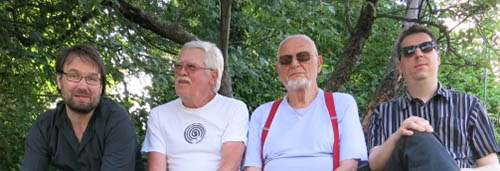










 Users Today : 24
Users Today : 24 Users Yesterday : 156
Users Yesterday : 156 This Month : 1891
This Month : 1891 This Year : 9268
This Year : 9268 Total Users : 230404
Total Users : 230404 Views Today : 51
Views Today : 51 Total views : 1966894
Total views : 1966894 Who's Online : 1
Who's Online : 1